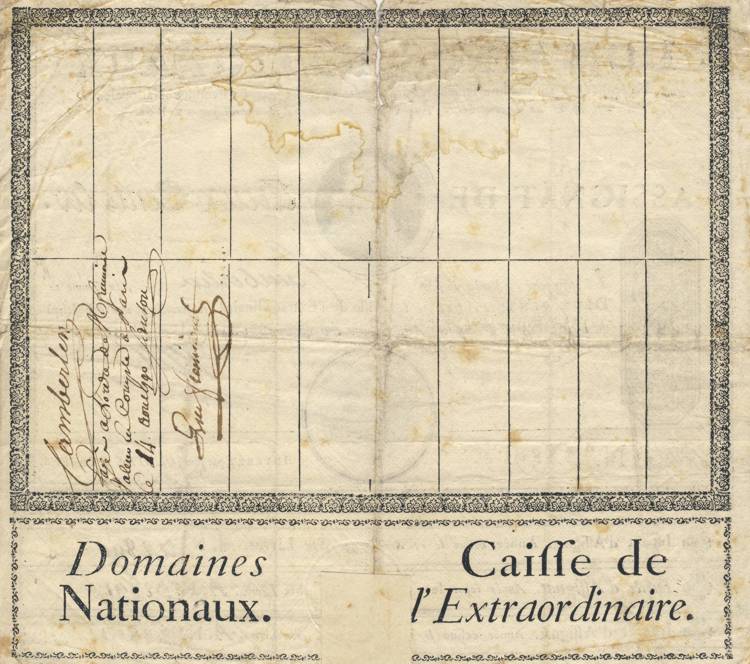Assignat
The assignats (from French assignation, instruction ' ) were the paper money used during the French Revolution.
In December 1789, the National Assembly decided to collect the church property in favor of the State in order to pay off the enormous debt burden and to contest the upcoming budget. Since one could not hope in a short time the country to sell the property, paid to the lenders, the debt in the form of assignats, which had the role of government bonds and were initially bear interest. These could be exchanged for the available farms, but were brought into circulation and primarily developed by the general method of payment.
The fact that the value of paper money was allegedly covered in full and interest by the for sale land ownership, it was hoped that the new paper money would win the people's trust quickly. At times, the possession and sale of gold and silver money was forbidden at high penalty and the population was invited to submit to the state, so as to force the acceptance of the assignats as a general means of payment.
Only assignats - then mandates
The first assignats were issued from 14 December 1789. Initially, the new money had a beneficial effect. The French economy was revived and the farmers showed their solidarity by the distributed land with the revolution. However, the interest rate was abandoned early in the following year. With time, more and more assignats were put into circulation by the government, what a strong inflation had the effect of including the general political instability contributed. Numerous English forgeries were also lose confidence in the assignats currency.
Already in February 1793, they had only 50 percent of its original value. It came to a hoarding of food, which, however, prohibited the Jacobins on 26 July by law; September 29, a maximum price for certain foods has also been prescribed.
However, this could only temporarily curb inflation. In April 1795 the value of the assignats fell to 8 percent. Many merchants refused then to accept paper money, which paid in assignats impoverished workers.
In February 1796, the Board, the assignats in the course of 30:1 decided to replace territoriaux by mandate. On March 18, the assignats were discontinued and replaced by territorial mandates. Their amount of money was limited initially to 2.4 billion Livre - they could be exchanged theoretically directly against state farms. The mandates but rapidly fell to about 3% of its original value until shortly before their Verrufung. Even before the Verrufung all assignats and mandates an attempt was made in the then occupied by France right bank of the Rhine to Cologne and Mainz, yet quickly turn this change has now become almost worthless French paper money in full German silver money. On May 21, 1797 all assignats and mandates were finally declared invalid. Starting at the August 15, 1795 began gradually the new dezimalgeteilte Franc exchange rate reform implied prepare. It began with the first minting of copper centime - and - Decime coins and silver 5 Franc coins as a new standard Kurantmünze from the year of issue 4 ( 1795-1796 ).




.jpg)


.gif)
_2.jpg)

.jpg)